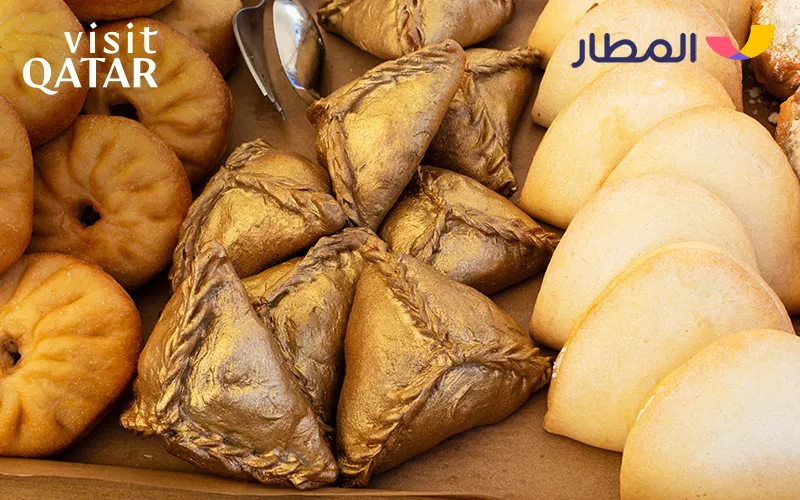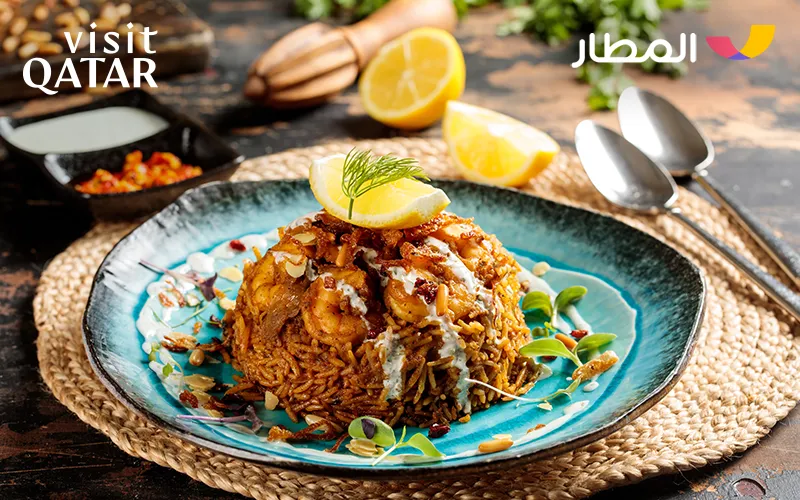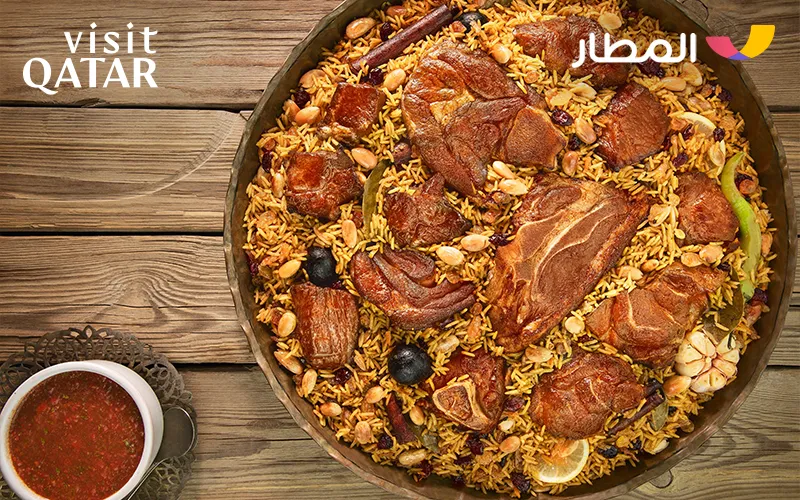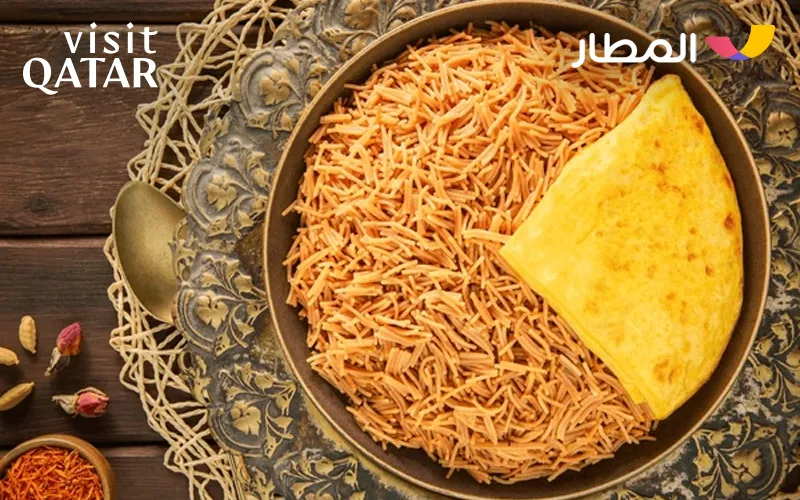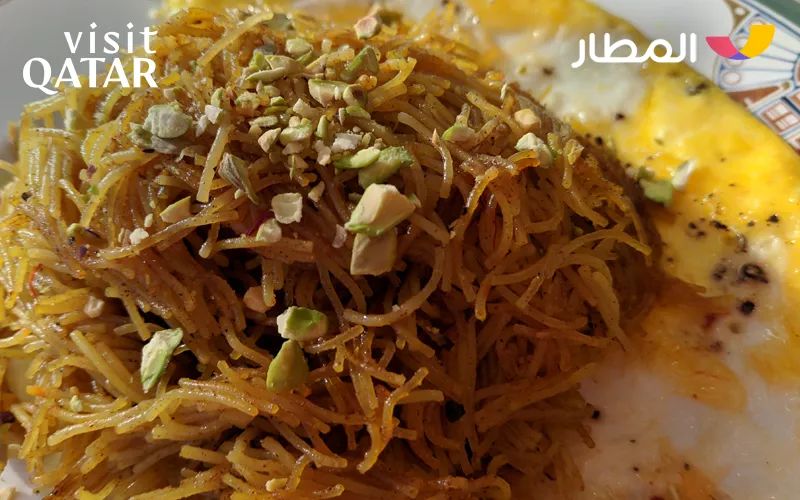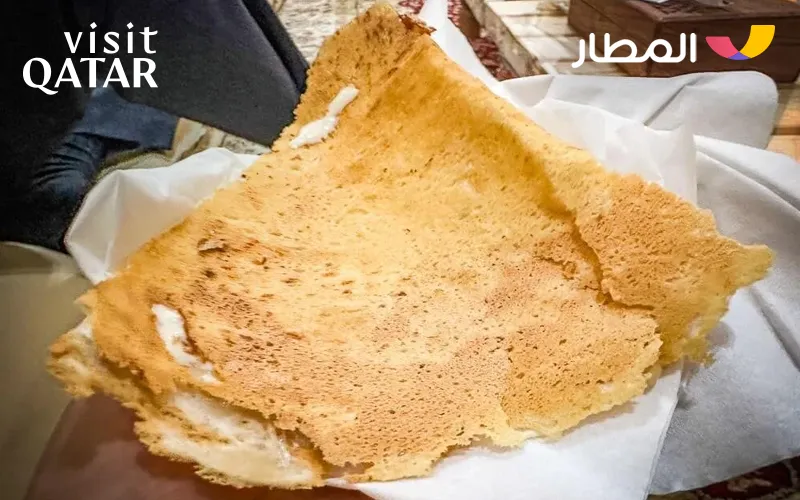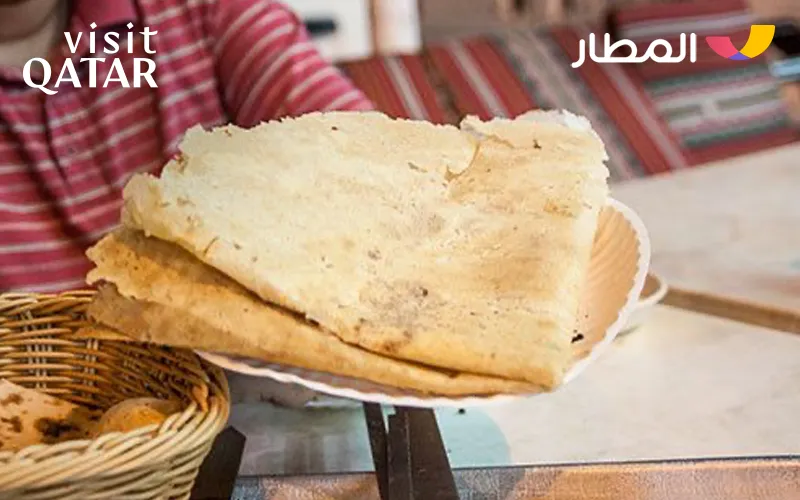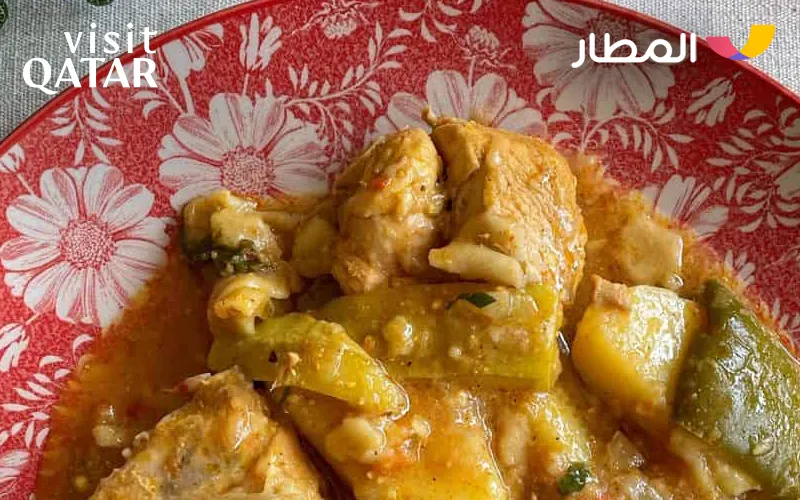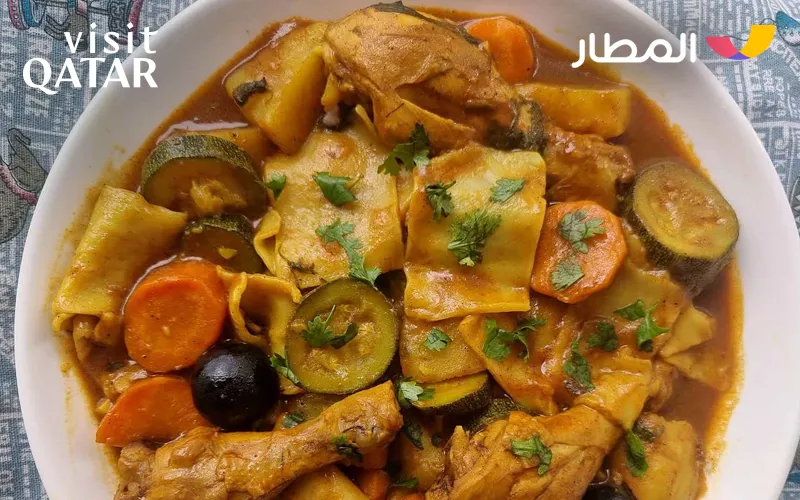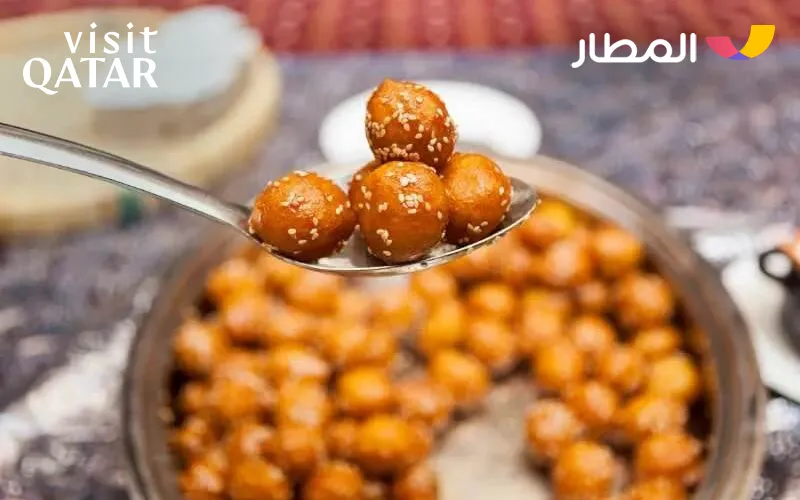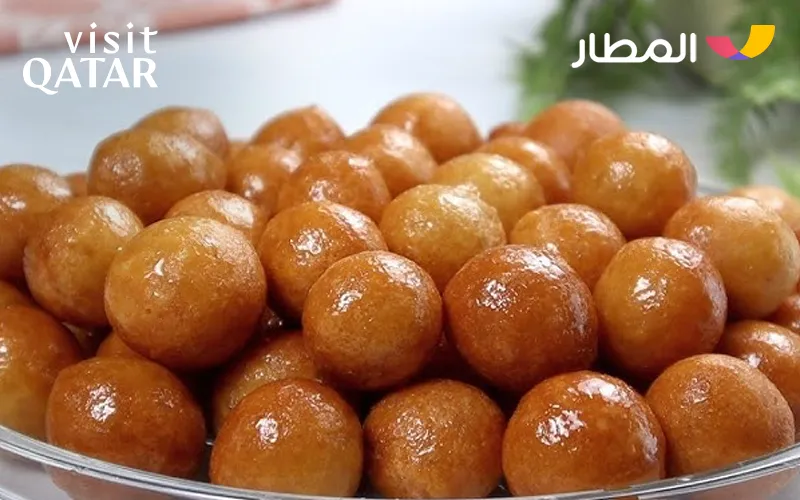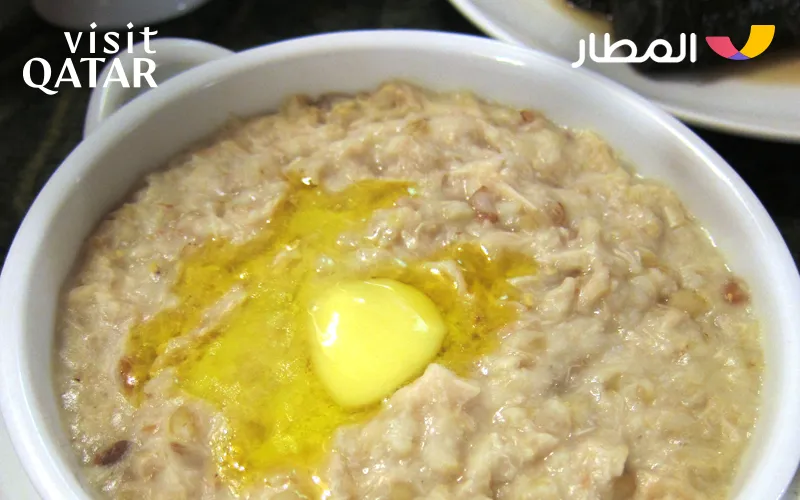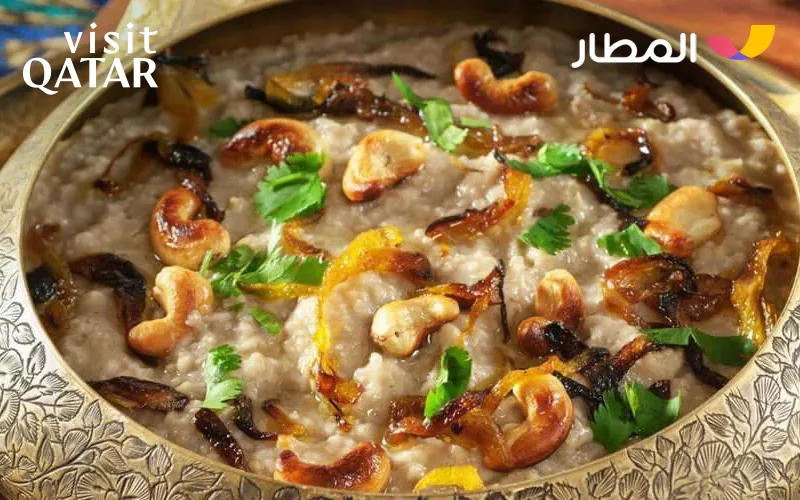Hidden behind the alleys of Doha and in its public spaces lie the most delicious traditional food in Qatar, carrying a rich heritage of flavor and taste. Here are the best seven Qatari traditional dishes you must try on your next trip to Doha to discover the nation’s culture through its food.
Qatari Heritage in the World of Food and Drink
Qatari cuisine reflects the authenticity of Arabic flavors blended with the richness of Persian, Indian, Levantine, and African influences. Over centuries of trade and travel, the local cuisine was shaped by Bedouin caravans in the desert and pearl divers along the coasts, mixing spices like cardamom, saffron, cinnamon, and turmeric to create its distinctive taste.
At the heart of Qatari culture lies generosity and hospitality, where offering food and drink symbolizes welcome and respect. Meals are often shared in large plates at the center of the table, bringing together family and friends. From hearty Ramadan breakfasts to evening karak tea gatherings, Qatari food is a journey through time, one that celebrates both simplicity and abundance.
Must-Try Qatari Traditional Dishes
Qatari cuisine offers a wide range of traditional food in Qatar, but these seven dishes are unmissable highlights.
-
Machboos: The National Flavor of Qatar
Machboos (or Makbous) is Qatar’s national dish, a rich combination of rice and meat (usually lamb or chicken) cooked slowly in one pot. Blended with warm spices like cardamom, cloves, and cinnamon, plus dried lime (loomi), this dish delivers a smoky-citrus aroma and an unforgettable depth of flavor.
It’s often topped with fried onions and served with spicy tomato sauce (dakkous) and yogurt or salad on the side.
-
Where to try it:
Visit Al Jasra Traditional Restaurant in Souq Waqif or Al Shami Restaurant in Doha for the most authentic taste.
-
Thareed: The Spirit of Ramadan on the Table
Thareed is one of the most symbolic traditional food in Qatar, often served during Ramadan. Thin Qatari bread (regag) is layered at the bottom of the dish and soaked in a savory broth of lamb or chicken with vegetables like potatoes and tomatoes.
The result is a soft, flavorful mix that combines the tenderness of bread with the richness of stew.
-
Where to try it:
Head to Shay Al Shamous in Souq Waqif or Khaneen Restaurant for an authentic homemade taste.
-
Balaleet: Sweet and Savory in One Bite
A staple Qatari breakfast, Balaleet blends sweet vermicelli with rose water, saffron, and cardamom, topped with lightly seasoned scrambled eggs. This delightful contrast between sweet and salty makes it one of the most unique traditional food in Qatar.
-
Where to try it:
Enjoy it at Shay Al Shamous or Basta Qatar, both offering breakfast dishes that perfectly mix heritage and modern flair.
-
Regag: The Street Bread Everyone Loves
Regag is a paper-thin Qatari bread, cooked on a hot griddle until crisp and golden. It can be spread with ghee, filled with egg and cheese, or topped with date syrup for a sweet treat.
Often paired with karak tea, it’s a favorite among locals for evening snacks.
-
Where to try it:
Walk through Souq Waqif in the evening and you’ll find women cooking Regag right before your eyes, a must-try experience for food lovers exploring Doha’s traditional food in Qatar scene.
-
Marqouq: The Qatari Stew of Dough and Flavor
Marqouq is a hearty stew of meat or chicken with vegetables like tomatoes and potatoes. Thin wheat dough pieces are cooked in the broth, absorbing the flavors and creating a thick, comforting meal.
-
Where to try it:
Try it at Al Bait Al Kuwaiti Restaurant in Doha for a homestyle Gulf experience that captures the warmth of traditional Qatari cooking.
-
Luqaimat: The Golden Honey Bites
These golden dough balls are deep-fried until crisp, then dipped in date syrup or sugar syrup with rose water and saffron. Luqaimat is a sweet symbol of Ramadan evenings and an essential part of traditional food in Qatar.
-
Where to try it:
Find them hot and fresh at Desert Rose Café in Msheireb Museums or from the stalls in Souq Waqif.
-
Harees: The Heritage Dish of Celebration
Harees combines crushed wheat and meat cooked slowly for hours until they blend into a smooth, porridge-like texture. Enriched with ghee and flavored with cardamom and cinnamon, it’s served during Ramadan, Eid, and weddings.
-
Where to try it:
Taste it at Al Hubara Restaurant in the Sheraton Doha Hotel during Ramadan, or experience it at a Qatari family gathering for the most authentic version.
Don’t Miss the Special Offers from almatar
Make your trip to Qatar even more enjoyable with almatar’s seat selection feature. Book your flight and select your preferred seat easily to ensure a comfortable journey to Doha, ready to explore the rich flavors of traditional food in Qatar waiting for you.
Conclusion
These seven dishes take you on a sensory journey through Qatar’s history and hospitality. From Bedouin stews by the campfire to the vibrant flavors of Doha’s markets, every bite tells a story. Discovering traditional food in Qatar is more than just eating; it’s embracing the nation’s culture, warmth, and generosity.
FAQs about Qatari Traditional Food
What are the most famous traditional dishes in Qatar?
Dishes like Machboos, Thareed, Harees, and Balaleet are iconic traditional food in Qatar, representing the country’s rich heritage.
Where can I try authentic Qatari cuisine?
Visit Souq Waqif or modern restaurants like Smat and Sasna in Doha, or enjoy themed nights at luxury hotels.
Are Qatari dishes spicy?
Qatari cuisine is aromatic rather than spicy, using spices like cinnamon and cardamom for depth, with optional chili sauces on the side.
Is food in Qatar expensive?
Qatar offers options for every budget, from affordable local eateries to luxurious fine-dining venues.
What drink best accompanies Qatari dishes?
The most popular is karak tea, a sweet spiced milk tea that pairs perfectly with Regag, Balaleet, and other traditional food in Qatar.

